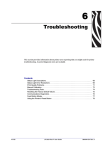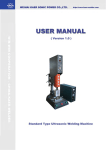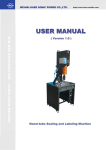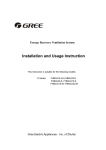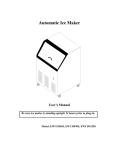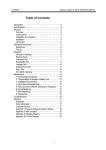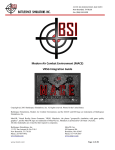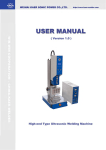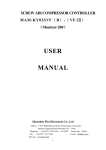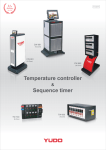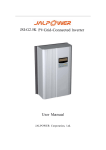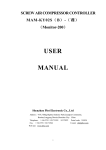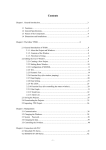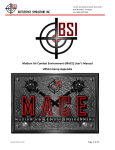Download User`s Manual - ultrasonic plastic welding machine|ultrasonic
Transcript
Important Statement 1. We will be responsible for free warranty and technical service in the coming 12 months under the warranty provision since delivery. 2. Maintenance service beyond the warranty period or not covered under warranty provision shall be available on paid basis. 3. The following cases do not fall into the category of our warranty: ☞ production line gets damaged while used in abnormal conditions. ☞ malfunction caused when working conditions are not in compliance with the requirements of production line. ☞ damage to production line due to maintenance and capital improvement without authorization. ☞ wearing parts like battery ☞ spare parts ☞ appearance and packing of production line ☞ accident and damage resulting from natural disaster or earthquake 4. The contents of this manual are only for reference. Please make enquiry to service hotline where there is anything unclear. 86-631-5690110. 5. China Weihai Kaer Ultrasonic Engineering Co., Ltd reserves the copyright to this manual and technical information for the production line. No alteration or reproduction is permitted without authorization. I. Overview 36-Head Geocell Ultrasonic Welding Line is an automatic geocell ultrasonic welding line. It can be used to weld plastics through ultrasonic energy. Ultrasonic welding is featured with high quality and speed, cleanness and low cost. It adopts the updated KCH series of ultrasonic welding machine, Omron programmable controller and Eview man-machine interface. Flexible integrated design is adopted for the whole unit, with leading technology, reliable operation and stable performance, as well as wide application in production of civil engineering materials. II. Structure Features and Working Principle 36-Head Geocell Ultrasonic Welding Line mainly consists of a number of ultrasonic plastic welding machines, main frame, moving system of workbench, pneumatic control system, program control system, electronic protection system and operation system. 1) Mechanical structure Refer to the attached diagrams of this manual for the appearance of the whole unit and names of each mechanical structure. 2) Electric portion Electric portion is mainly composed of four parts: electric cabinet, operation panel and protective circuit of individual control. Installed in the electric cabinet re master power supply for production line, all the ultrasonic welding machines and ultrasonic generator, and PLC and all final control relay; protective circuit of individual control is installed in the cabinet of each ultrasonic welding machine. Please refer to “User’s Manual of KCH Series of Ultrasonic Plastic Welding Machine” for protective circuit of individual control. Refer to the attached diagrams of this manual for each specific electric portion. 3) Power detection Power detection cover two key parts: signal acquisition and signal processing. Signal acquisition is built in ultrasonic generator while signal processing stays on logical control panel of individual unit. Real-time inspection can be conducted on ultrasonic wave generating power to check if power is too small or zero. 4) Instruction for welding process of production line Welding process of production line is divided into individual unit and on-line unit, and selection can be made through selector switch of “Operating Mode” on the panel of each individual unit. In the state of individual unit, operating tools are in a position of reaching out and lowering on the touch screen, commissioning and repair welding can be made by the corresponding individual unit of the production line. When an individual unit in automatic state is selected, an operator just needs a manual loading and press “Master Operation” button, the production line will make operation of each process covering automatic shifting →welding. And it will automatically get into unloading state waiting for unloading when reaching the set layer. III. Main working technical parameters 1) working voltage: logic portion: three phase, AC 220V±5% 2) working current: less than 71 A 3) power supply noise: not exceeding 100Vp_p 4) power interruption allowed: less than 10ms 5) operating temperature: 0~50℃ 6) storage temperature with production line: -10~60℃ 7) ambient humidity: 20~70%(no condensation) 8) vibration source around 9) no dust or active gas around 10) external dimension of production line: 1300㎝(L) ×400㎝(W) ×230㎝(H) IV. Installation and Commissioning 4.1 Main requirements for installation 1) minimum floor area for installation space shall be 1800 ㎝(L) ×600 ㎝(W), with shop height not less than 300 ㎝. 2) installation foundation for production line should be reinforced concrete, with its thickness not less than 100 ㎜ and its overall planeness for the foundation of 1 ㎜. 3) surface parallelism between tooth surface of acoustic welding head and tool backing plate ≤0.1 ㎜. 4) location of each acoustic welding head should be distributed with correct center alignment. 5) power and air supplies should meet the requirements for working technical parameters of production line. Install a voltage stabilizer or take other measures to ensure stable voltage where there is unstable voltage. 6) there should be no fire around production line, with good ventilation and stable installation. 7) production line must secure a good ground connection before use, with its ground resistance less than 4Ω. Any use is prohibited without proper grounding. 4.2 Commissioning Conduct commissioning over lifting cylinder and feeding cylinder first, mainly setting the speed of cylinders. 1) get connected with air supply and turn on power switch. 2) ensure that all acoustic welding heads are in position of being lifted. 3) click such buttons on the touch screen as “manual testing”→ “lifting cylinder down”, “lifting cylinder up”, “feeding cylinder out”, and “feeding cylinder back”. However, please ensure that feeding cylinder can act only when lifting cylinder is in a state of lifting. Otherwise, there shall be no effect. Coordinate to see the motion velocity at each position between lifting cylinder and feeding cylinder. Matching rhythm between the two cylinders can be adjusted by changing the flow rate of one-way throttle valve on the cylinder. Note: Please never touch the cylinders themselves and the mechanical part inside their link stroke during operation, to prevent any accident like clamp injury! Do not make any operation until leaving the menu of “manual testing” after operation is completed. After leaving the menu of “manual testing”, the equipment will achieve an automatic restoration of the state before entering “manual testing”. Caution! Complete commissioning for each position of lifting cylinder and feeding cylinder, and leave the menu of “manual testing”. Then you can make separate commissioning over each ultrasonic welding unit, with main items for commissioning: check working frequency, set delay time, welding time, pressure dwell time, pressure value, and parallelism between acoustic welding head and lateral backing plate. Operating sets are as follows: A. Connect air supply and turn on power supply switch. B. Set the “online” switch on the panel of individual unit to “off”. C. Make sure all acoustic welding heads are in the position of lifting. Click the “Manual Testing” →“feeding cylinder out” →“lifting cylinder down” buttons on the touch screen, to bring both cylinders to the right position. D. Turn off the power switch of generator for the non-commissioned individual unit to be commissioned, and the power supply of generator for the non-commissioned individual unit should be disconnected. E. Click the working buttons on the panel of individual unit, streamline each working parameter of this unit as per “Instruction Manual for KCH Series of Ultrasonic Plastic Welding Machine”. Turn of all power supply for individual units after completing commissioning for each ultrasonic welding machine one by one. Set “online” switches on all panels of all individual units to “on” and inch the “Master Operation” button, modify the action time parameters for the production line, check the consistency of all in operation, and the welding effect of the whole unit. The commissioning is completed for formal running after reaching desired requirements. Note: Two pieces of sheet materials must be placed under the acoustic welding heads during welding commissioning. Otherwise, acoustic welding heads may be damaged. V. Operation 5.1 Normal operation 1) Check or set to ensure that position for each ultrasonic welding machine and welding backing plate is properly arranged as required by the specifications for geocell. The value set for welding layer on the man-machine interface should have proper pitch and welding time. 2) Move individual unit to a proper location based on requirement for geocell’s pitch, and insert aviation plug into the socket corresponding to different colors, as follows: 330㎜ pitch———blue numbering 440㎜ pitch———red numbering 660㎜ pitch———yellow numbering 3) Check if air pressure is normal. Check again all acoustic welding heads are in a posit lifted. 4) Check and confirm that turn on “Air Switch for Master Power Supply” in the main control cabinet and the power switch for each individual unit after normal power supply and voltage are reached. 5) Set “Operating Mode” switch on individual control panel to “on-line unit”. 6) Turn on the key switch on master operation panel and connect power supply for main control cabinet. 7) Make sure production line is in its initial condition (all cylinders are in drawback position; the completed number of layers on the touch screen is 0). 8) Press “Master Operation” button after everything is normal, and odd tool backing plate reaches out. Then put the first piece of plastic sheet on the backing plate. 9) Make sure that the first piece of sheet is well placed, press “Master Operation” button, and eventool backing plate reaches out, and stays on the first piece just placed. Then put the second piece of sheet. 10) Confirm that the operation is correct, press “Master Operation” button, and the production line will complete the first welding automatically and will also complete shifting of tool backing plate automatically. 11) Press “Master Operation” button each time a piece of sheet is well placed, until reaching the number of welding layers set on the man-machine interface. Production line will automatically implement unloading program and then the geocell fully welded will be taken out of batch bin manually. Note: production line requires cooperation between two operators. To ensure safety, two ”Master work”, two “Master Operation” buttons shall have to be pressed in a short time at the same time to give an effective working instruction. 5.2 Other operation 1) In case of emergency during the operation of production line, stop the operation immediately by pressing the “Master emergency stop” button on operation panel. The production line will stop the operation completely and maintain at the current status, but the cylinders of acoustic welding head will rise and return automatically. After the emergency is treated, turn the “Master emergency stop” button to the right, to pull it up. Then, press the “Master operation” button, the production line will start from the status of emergency stop, and continue to work according to the set program. 2) There is a “Reset” button on the human-machine interface. Its function is to make the acoustic heads of the welding machines return to their original positions; after completing the preparation for unloading the materials, return to the primary welding position. Therefore, press this button only when it is necessary to do so (it will be effective only when pressing and holding it for three seconds or more). During normal operation, do not press this button. 3) There is a “Shutdown screen” on the human-machine interface when shutting down the machine. Make sure to enter the shutdown screen before switching off the power supply. 5.3 Operation of touch screen 1) Start screen Switch on the touch screen, and enter the start screen. Click “中文(Chinese)”, to enter the Chinese menu. Click “English”, to enter the English menu. If no interface language is selected, the default value is the Chinese. After selecting the language, a pull-up menu will appear when clicking the low right corner. 2) Running screen Click the low right corner of the screen, a pull-up menu will appear. Select the “Running screen” from the pull-up menu to enter the running screen. This screen displays the current operating information and status of the production line, of which, the “Reset” button can restore the production line to the initial status. 3) Manual testing Click the “Manual testing” on the pull-up menu, to enter the manual testing screen. On this screen, manual control over the parts can be realized. Change to other screens by clicking the buttons on the pull-up menu appeared on the low right corner of the screen. 4) Setting screen Click the “Setting screen” on the pull-up menu to enter the setting screen. The parameters set will become effective immediately. Click the parameters to enter the items to be modified: Description of the parameters: Setting the layers: Total layers to be welded by the production line under the mode of automatic welding; Welding time: The longest continuous welding time of all the individual units under the mode of automatic welding; Pitch selection: The pitch between the products when using the production line; System time: The standard date and time of the current system. Click “Setting the special data”, to enter the following screen: Click the parameters to for the items to be modified: Description of the parameters: Extending time of straight guide rail: the time range of extending the feeding cylinder; Rise time of straight guide rail: the time range of retracting the lifting cylinder; Return time of straight guide rail: the time range of retracting the feeding cylinder; Fall time of straight guide rail: the time range of extending the lifting cylinder; Power detection time: the location of power detection sampling point. The range from the start point of delay time to the point of finishing the test time shall be taken as the power sampling point. The modification of parameters shall be carried out by the professionals. The initial password is 1234. It can be changed. Change to other screens by clicking the buttons on the pull-up menu appeared on the low right corner of the screen. 5) Alarm screen When clicking the “Alarm screen” on the pull-up menu, the touch screen will be automatically switched to the fault alarm record screen, which displays the system's current and historical operation and fault information, for being used by the maintenance man to repair the production line. Change to other screens by clicking the buttons on the pull-up menu appeared on the low right corner of the screen. 6) Shutdown screen Before switching off the touch screen, enter the shutdown screen first, and then turn off the power supply. VI. Fault judgment and troubleshooting In the event of any omen of the fault during the operation of production line, the operator shall pay great attention to it and observe it calmly, judge the location of the fault and the possible causes, and determine a feasible check and repair method. The operator must operate the production line according to the “work procedure”, and shall not violate the instructions, so as to avoid serious accident. When dealing with the fault, observe the following steps no matter the fault occurred with the whole production line or with individual unit: 1. Judge the symptom and the position of the fault through observation, listening and testing. 2. Analyze the possible causes of the fault. 3. Look up the equipment operating records and fault file. 4. Determine corresponding handling methods and work procedures. 5. Begin to check and repair. Faults and troubleshooting 1. The production line cannot start after switching on the general power supply and turning on the key switch of master control cabinet. Check and analyze: Observe the three voltmeters and three ampere meters on the master control cabinet, to see if the values are normal. 1.1 If the voltmeters are not indicating at 220V, and the ampere meters are not indicating the same value, check the following: 1) whether QF1 residual current circuit breaker is started or damaged. 2) whether the contact of QF1 residual current circuit breaker is in good condition. 3) whether the power supply line is correct, whether there is any phase loss (check with a universal meter). 1.2 If the voltmeters are indicating at 220V, and the ampere meters are indicating the same value, check the following: 1) whether the contact of key switch is in good condition, and whether the control circuit is broken. 2) whether KM1 AC contactor functions or is damaged. 3) 4) 5) 6) whether the loop of KM1 AC contactor is damaged (check with a universal meter). whether QF2 residual current circuit breaker is closed or damaged. whether the fuse is damaged, which causes broken circuit. whether the air pressure is too low (lower than the normal operating range). 2. When switching on the key switch, QF2 residual current circuit breaker trips out. Check and analyze: Switch on the key switch, QF2 residual current circuit breaker trips out. It is related to the current and load borne by it. 1) According to the electrical wiring diagram, check whether the insulated wire cover of subsequent circuit is broken and leaking. 2) Check whether the previous power supply is 220V and whether there is over high voltage switched on. 3) whether there is over large load switched on, which makes the total current exceed the nominal current of QF2. 3. Automatic operation is not available. 3.1 If the commissioning of individual unit is normal, however, automatic operation is not available, check the following: 1) whether the selection button of operation mode on workbench operation panel is selected at the on-line mode. 2) whether all the emergency stop buttons are reset. 3) whether the contact of master operation button is damaged. 4) whether the two master operation buttons are pressed simultaneously within the limited time, and whether they are sending out valid working command, and observe whether the indicator of input point corresponding to PLC lights up. 5) if PLC inputs but doesn’t output, it means that PLC is faulty. 6) if PLC inputs and outputs, check whether the output line is intact and whether the relay is damaged. 3.2 If the commissioning of individual unit is abnormal, check and remove the abnormality. 4. The whole line does not function. Check and analyze: After starting the production line, the whole line does not function with manual or automatic commissioning. Observe whether the value indicated by the pressure sensor reaches the rated pressure. 4.1 If no pressure is available, check the following: 1) whether the power supply line is connected properly among the air compressor, air reservoir and air filter. 2) whether the air supply connecting pipes among the air compressor, air reservoir and air filter are connected properly and smoothly and free from leaking. 3) whether the valves among the air compressor, air reservoir and air filter are opened completely, and in good condition. 4.2 If the pressure is available, check the following: 1) whether the internal logic board of individual unit is in good condition. 2) whether the throttle valve of individual unit is switched off. 3) whether the power supply line of individual unit is in good condition and the control circuit is broken. 4) whether all the emergency stop buttons are reset and the contacts are in good condition. 5) whether master operation button is pressed when individual units are not under the status of on-line unit. 5. Fault of PLC. Check and analyze: Observe the indicators on PLC, and analyze the following: 1) if the power indicator “POW” does not light up, it means that the power supply is not available; if it shows green, it means the power supply is normal. 2) if the indicator “RUN” shows green, it means that CPU is in good condition; if the indicator does not light up, it means that CPU is out of order, or is programming. 3) if the indicator “COMM” shows red, it means that PLC is communicating with other equipment. This indicator lights up when operating the computer, human-machine interface, portable programmer, and other computer (or PLC). 4) The last indicator can indicate two messages: when the red light illuminates, it means that CPU is out of order; if the indicator does not light up, it means that CPU is in good condition. If the red light flashes, it means that there isn’t enough electricity in the battery of PLC or the battery is invalid; if the indicator does not light up, it means that CPU is in good condition. 6. Alarm. Check and analyze: If the alarm is given when operating the machine manually or automatically, i.e. the alarm lamp on master control panel flashes, and simultaneously the buzzer in the alarm lamp buzzes, it is possibly caused by the following (when human-machine interface displays the fault, deal with it directly according to the fault location displayed on the screen): 1) When the welding of a machine is unusual: it means that the ultrasonic welding portion is out of order when the machine is welding. The ultrasonic intensity is too small or no ultrasonic is generated, which affects the welding effect. 2) Phase loss or incorrect phase sequence: it means that phase loss or incorrect phase sequence occurs with general power supply of the equipment. Please check the general power supply. 3) Low compressed air pressure: it means that the general air supply pressure of the equipment is not within the scope suitable for the production. Alarm will be given in case of over low or over high pressure. Then, please check: ① whether the air compressor is powered on normally; ② whether the control valve of general air supply portion functions normally; ③ whether the pressure sensor (arranged in the rear of electric cabinet) is set properly (reference value 0.45-0.65Mpa). 7. Unbalanced and noisy lifting of acoustic welding head and movement of tool backing plate. Check and analyze: Check the air supply portion first, then, check the mechanical connection portion. 7.1 Air supply portion 1) Check whether the air pressure is too low. 2) Whether the control valve functions normally. 3) Whether there is too much water accumulated in the filter. 4) Whether the air supply connecting pieces are loose. 7.2 Mechanical connection portion 1) Check whether the bearing and slideway are filled with oil properly. 2) Whether the various parts function harmoniously. 3) Whether the related fasteners are loose. 8. For the operating instructions and the judgment and maintenance of common faults of individual unit of ultrasonic plastic welding machine, please refer to "Operating Instructions of KCH Series Ultrasonic Plastic Welding Machine". VII. Safety Precautions 1. The untrained personnel shall not operate the machine or watch the machine in a close distance. 2. The machine shall be put into operation only after successful commissioning. 3. Do not operate the machine without safe grounding. 4. Emergency stop function is invalid under the status of manual test. Pay attention to the safety! 5. Do not place your hand or any part of your body on the production line during the operating time. 6. Before starting the production line, make sure to confirm that the acoustic welding head is at the retracted position. 7. After the production line is energized, do not attempt to move the acoustic welding head. Otherwise, it may result in the deflection of mechanical location of the production line, which will cause bad welding effect. 8. Be careful when loading the workpiece, to avoid empty welding (no workpiece at the welding operation). Empty welding will seriously affect the service life of acoustic welding head and tool backing plate. 9. When the previous process cannot provide the workpiece to be welded in time, or when the operator has to leave his post temporarily for other reasons, the operator must set the key switch on master operation panel of the production line at “OFF”, to avoid the occurrence of empty welding due to triggering the operation start button unintentionally. 10. When the production line gives alarm during operation, the operator shall inform the team leader. The team leader shall make arrangement for dealing with the fault causes and removing the fault. 11. Only the maintenance man of the production line shall operate the fault alarm records on the human-machine interface. Any person other than the maintenance man of the production line shall not amend or delete the records. 12. Switch off the power supply and air supply when carrying out overhauling and maintenance. 13. After completing each shift of work, switch off the machine, get rid of the residues on the surface of acoustic welding head, and clean it with a piece of clean cloth. VIII. Technical Service In case of the following problems, please contact the manufacturer: 1. Problems not mentioned in the manual. 2. PLC faults. Service hotline: 086-0631-5690111 Diagram of External Configuration of the Whole Unit 1. 2. 3. 4. 5. 6. 7. 8. The panel of individual unit; Material rack; Base plate; Wiring channel; Frame of individual unit; Electric cabinet; Master operation button; Master emergency stop button. Diagram of the Details of Individual Unit Structure 9. 10. 11. 12. 13. 14. Acoustic welding head; Material trough; Straight guide rail (tool backing plate) ; Ultrasonic generator; Tool feeding cylinder; Tool lifting cylinder; Diagram of the Rear of the Equipment When changing the pitch according to the requirements for geocell pitch, unscrew the lock screw, take down the strip for clamping the frame of individual unit, and move the frame of individual unit to an appropriate position. Then, mount the clamping strip and fix it. Insert aviation plugs into the corresponding sockets numbered with different colors. In such a way, the changing of the pitch is finished. 15. 16. 17. 18. 19. Aviation plug; Strip for clamping the frame of individual unit; Lock screw; Supply socket; Rear limit stop. Distribution Diagram of General Air Supply Portion 20. 21. 22. 23. High-efficiency filter; Cooling and drying machine; Air reservoir Air compressor Statement Products are subject to change without notice. All rights related to the copyright and interpretation are reserved with Weihai Kaer Ultrasonic Engineering Co., Ltd, who has the right for interpretation and correction in case of any misprinting. This manual is only used as instruction for users in using relevant products, rather than a contractual text. Edition Number: 2008-10-01




















